English Essay: Literary Analysis of Three Short Stories
VerifiedAdded on 2022/08/18
|5
|1132
|18
Essay
AI Summary
This essay provides a literary analysis of three short stories: "The Lottery" by Shirley Jackson, and "The Story of an Hour" and "Desiree's Baby" by Kate Chopin. The essay examines the literary elements employed by the authors, including irony and foreshadowing, to depict themes of change, fate, and societal hypocrisy. It focuses on the development and significance of key characters, such as Tessie Hutchinson, Mrs. Mallard, and Desiree, to illustrate how these characters are pivotal in understanding the impact of change and the societal critiques presented in each story. The analysis also highlights the authors' use of satire and other literary techniques to convey their messages about the complexities of human experience and societal norms. The essay concludes by emphasizing the importance of these characters in illuminating the themes of change and the hypocrisy within the respective societies depicted in the stories.
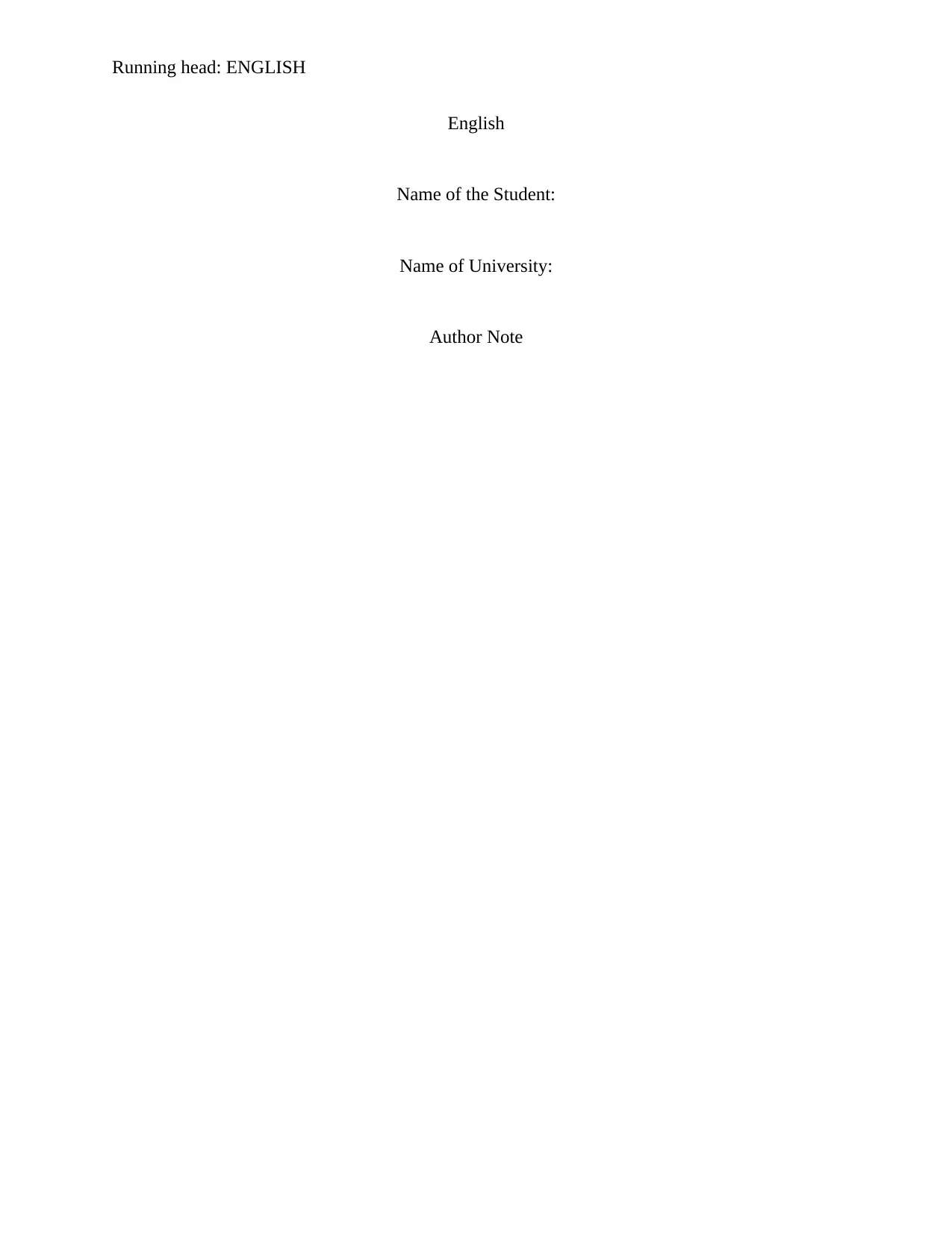
Running head: ENGLISH
English
Name of the Student:
Name of University:
Author Note
English
Name of the Student:
Name of University:
Author Note
Paraphrase This Document
Need a fresh take? Get an instant paraphrase of this document with our AI Paraphraser
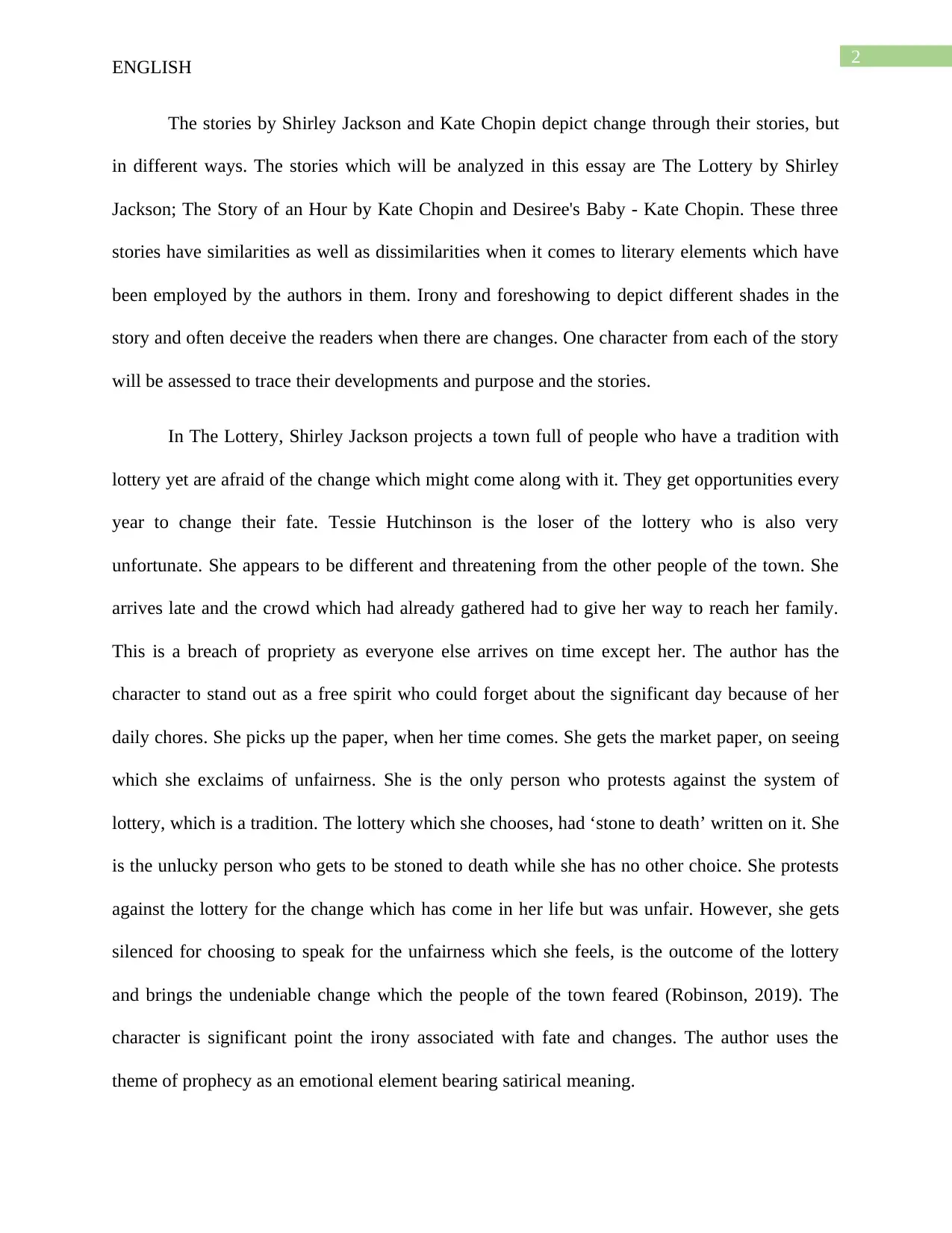
2
ENGLISH
The stories by Shirley Jackson and Kate Chopin depict change through their stories, but
in different ways. The stories which will be analyzed in this essay are The Lottery by Shirley
Jackson; The Story of an Hour by Kate Chopin and Desiree's Baby - Kate Chopin. These three
stories have similarities as well as dissimilarities when it comes to literary elements which have
been employed by the authors in them. Irony and foreshowing to depict different shades in the
story and often deceive the readers when there are changes. One character from each of the story
will be assessed to trace their developments and purpose and the stories.
In The Lottery, Shirley Jackson projects a town full of people who have a tradition with
lottery yet are afraid of the change which might come along with it. They get opportunities every
year to change their fate. Tessie Hutchinson is the loser of the lottery who is also very
unfortunate. She appears to be different and threatening from the other people of the town. She
arrives late and the crowd which had already gathered had to give her way to reach her family.
This is a breach of propriety as everyone else arrives on time except her. The author has the
character to stand out as a free spirit who could forget about the significant day because of her
daily chores. She picks up the paper, when her time comes. She gets the market paper, on seeing
which she exclaims of unfairness. She is the only person who protests against the system of
lottery, which is a tradition. The lottery which she chooses, had ‘stone to death’ written on it. She
is the unlucky person who gets to be stoned to death while she has no other choice. She protests
against the lottery for the change which has come in her life but was unfair. However, she gets
silenced for choosing to speak for the unfairness which she feels, is the outcome of the lottery
and brings the undeniable change which the people of the town feared (Robinson, 2019). The
character is significant point the irony associated with fate and changes. The author uses the
theme of prophecy as an emotional element bearing satirical meaning.
ENGLISH
The stories by Shirley Jackson and Kate Chopin depict change through their stories, but
in different ways. The stories which will be analyzed in this essay are The Lottery by Shirley
Jackson; The Story of an Hour by Kate Chopin and Desiree's Baby - Kate Chopin. These three
stories have similarities as well as dissimilarities when it comes to literary elements which have
been employed by the authors in them. Irony and foreshowing to depict different shades in the
story and often deceive the readers when there are changes. One character from each of the story
will be assessed to trace their developments and purpose and the stories.
In The Lottery, Shirley Jackson projects a town full of people who have a tradition with
lottery yet are afraid of the change which might come along with it. They get opportunities every
year to change their fate. Tessie Hutchinson is the loser of the lottery who is also very
unfortunate. She appears to be different and threatening from the other people of the town. She
arrives late and the crowd which had already gathered had to give her way to reach her family.
This is a breach of propriety as everyone else arrives on time except her. The author has the
character to stand out as a free spirit who could forget about the significant day because of her
daily chores. She picks up the paper, when her time comes. She gets the market paper, on seeing
which she exclaims of unfairness. She is the only person who protests against the system of
lottery, which is a tradition. The lottery which she chooses, had ‘stone to death’ written on it. She
is the unlucky person who gets to be stoned to death while she has no other choice. She protests
against the lottery for the change which has come in her life but was unfair. However, she gets
silenced for choosing to speak for the unfairness which she feels, is the outcome of the lottery
and brings the undeniable change which the people of the town feared (Robinson, 2019). The
character is significant point the irony associated with fate and changes. The author uses the
theme of prophecy as an emotional element bearing satirical meaning.
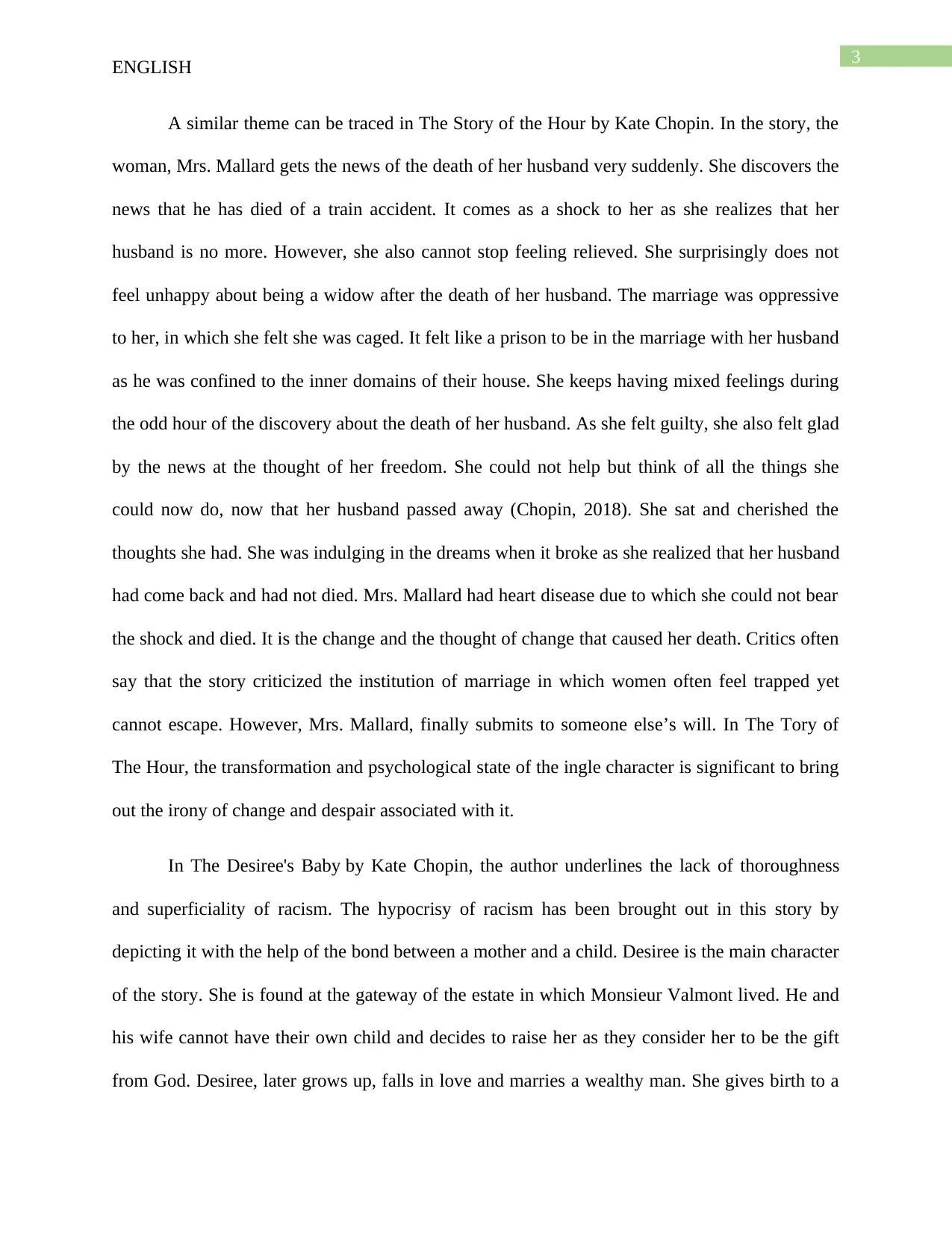
3
ENGLISH
A similar theme can be traced in The Story of the Hour by Kate Chopin. In the story, the
woman, Mrs. Mallard gets the news of the death of her husband very suddenly. She discovers the
news that he has died of a train accident. It comes as a shock to her as she realizes that her
husband is no more. However, she also cannot stop feeling relieved. She surprisingly does not
feel unhappy about being a widow after the death of her husband. The marriage was oppressive
to her, in which she felt she was caged. It felt like a prison to be in the marriage with her husband
as he was confined to the inner domains of their house. She keeps having mixed feelings during
the odd hour of the discovery about the death of her husband. As she felt guilty, she also felt glad
by the news at the thought of her freedom. She could not help but think of all the things she
could now do, now that her husband passed away (Chopin, 2018). She sat and cherished the
thoughts she had. She was indulging in the dreams when it broke as she realized that her husband
had come back and had not died. Mrs. Mallard had heart disease due to which she could not bear
the shock and died. It is the change and the thought of change that caused her death. Critics often
say that the story criticized the institution of marriage in which women often feel trapped yet
cannot escape. However, Mrs. Mallard, finally submits to someone else’s will. In The Tory of
The Hour, the transformation and psychological state of the ingle character is significant to bring
out the irony of change and despair associated with it.
In The Desiree's Baby by Kate Chopin, the author underlines the lack of thoroughness
and superficiality of racism. The hypocrisy of racism has been brought out in this story by
depicting it with the help of the bond between a mother and a child. Desiree is the main character
of the story. She is found at the gateway of the estate in which Monsieur Valmont lived. He and
his wife cannot have their own child and decides to raise her as they consider her to be the gift
from God. Desiree, later grows up, falls in love and marries a wealthy man. She gives birth to a
ENGLISH
A similar theme can be traced in The Story of the Hour by Kate Chopin. In the story, the
woman, Mrs. Mallard gets the news of the death of her husband very suddenly. She discovers the
news that he has died of a train accident. It comes as a shock to her as she realizes that her
husband is no more. However, she also cannot stop feeling relieved. She surprisingly does not
feel unhappy about being a widow after the death of her husband. The marriage was oppressive
to her, in which she felt she was caged. It felt like a prison to be in the marriage with her husband
as he was confined to the inner domains of their house. She keeps having mixed feelings during
the odd hour of the discovery about the death of her husband. As she felt guilty, she also felt glad
by the news at the thought of her freedom. She could not help but think of all the things she
could now do, now that her husband passed away (Chopin, 2018). She sat and cherished the
thoughts she had. She was indulging in the dreams when it broke as she realized that her husband
had come back and had not died. Mrs. Mallard had heart disease due to which she could not bear
the shock and died. It is the change and the thought of change that caused her death. Critics often
say that the story criticized the institution of marriage in which women often feel trapped yet
cannot escape. However, Mrs. Mallard, finally submits to someone else’s will. In The Tory of
The Hour, the transformation and psychological state of the ingle character is significant to bring
out the irony of change and despair associated with it.
In The Desiree's Baby by Kate Chopin, the author underlines the lack of thoroughness
and superficiality of racism. The hypocrisy of racism has been brought out in this story by
depicting it with the help of the bond between a mother and a child. Desiree is the main character
of the story. She is found at the gateway of the estate in which Monsieur Valmont lived. He and
his wife cannot have their own child and decides to raise her as they consider her to be the gift
from God. Desiree, later grows up, falls in love and marries a wealthy man. She gives birth to a
⊘ This is a preview!⊘
Do you want full access?
Subscribe today to unlock all pages.

Trusted by 1+ million students worldwide
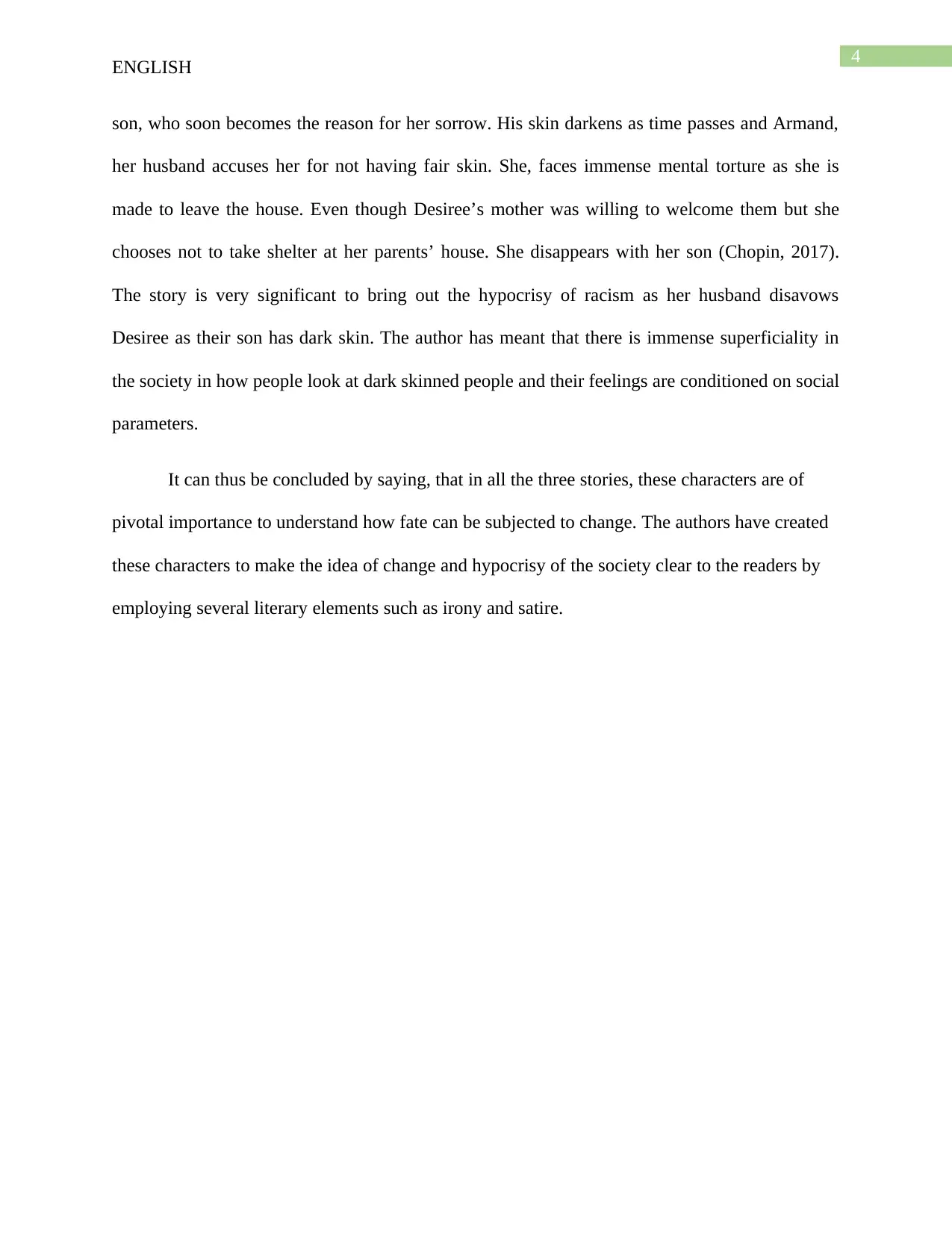
4
ENGLISH
son, who soon becomes the reason for her sorrow. His skin darkens as time passes and Armand,
her husband accuses her for not having fair skin. She, faces immense mental torture as she is
made to leave the house. Even though Desiree’s mother was willing to welcome them but she
chooses not to take shelter at her parents’ house. She disappears with her son (Chopin, 2017).
The story is very significant to bring out the hypocrisy of racism as her husband disavows
Desiree as their son has dark skin. The author has meant that there is immense superficiality in
the society in how people look at dark skinned people and their feelings are conditioned on social
parameters.
It can thus be concluded by saying, that in all the three stories, these characters are of
pivotal importance to understand how fate can be subjected to change. The authors have created
these characters to make the idea of change and hypocrisy of the society clear to the readers by
employing several literary elements such as irony and satire.
ENGLISH
son, who soon becomes the reason for her sorrow. His skin darkens as time passes and Armand,
her husband accuses her for not having fair skin. She, faces immense mental torture as she is
made to leave the house. Even though Desiree’s mother was willing to welcome them but she
chooses not to take shelter at her parents’ house. She disappears with her son (Chopin, 2017).
The story is very significant to bring out the hypocrisy of racism as her husband disavows
Desiree as their son has dark skin. The author has meant that there is immense superficiality in
the society in how people look at dark skinned people and their feelings are conditioned on social
parameters.
It can thus be concluded by saying, that in all the three stories, these characters are of
pivotal importance to understand how fate can be subjected to change. The authors have created
these characters to make the idea of change and hypocrisy of the society clear to the readers by
employing several literary elements such as irony and satire.
Paraphrase This Document
Need a fresh take? Get an instant paraphrase of this document with our AI Paraphraser
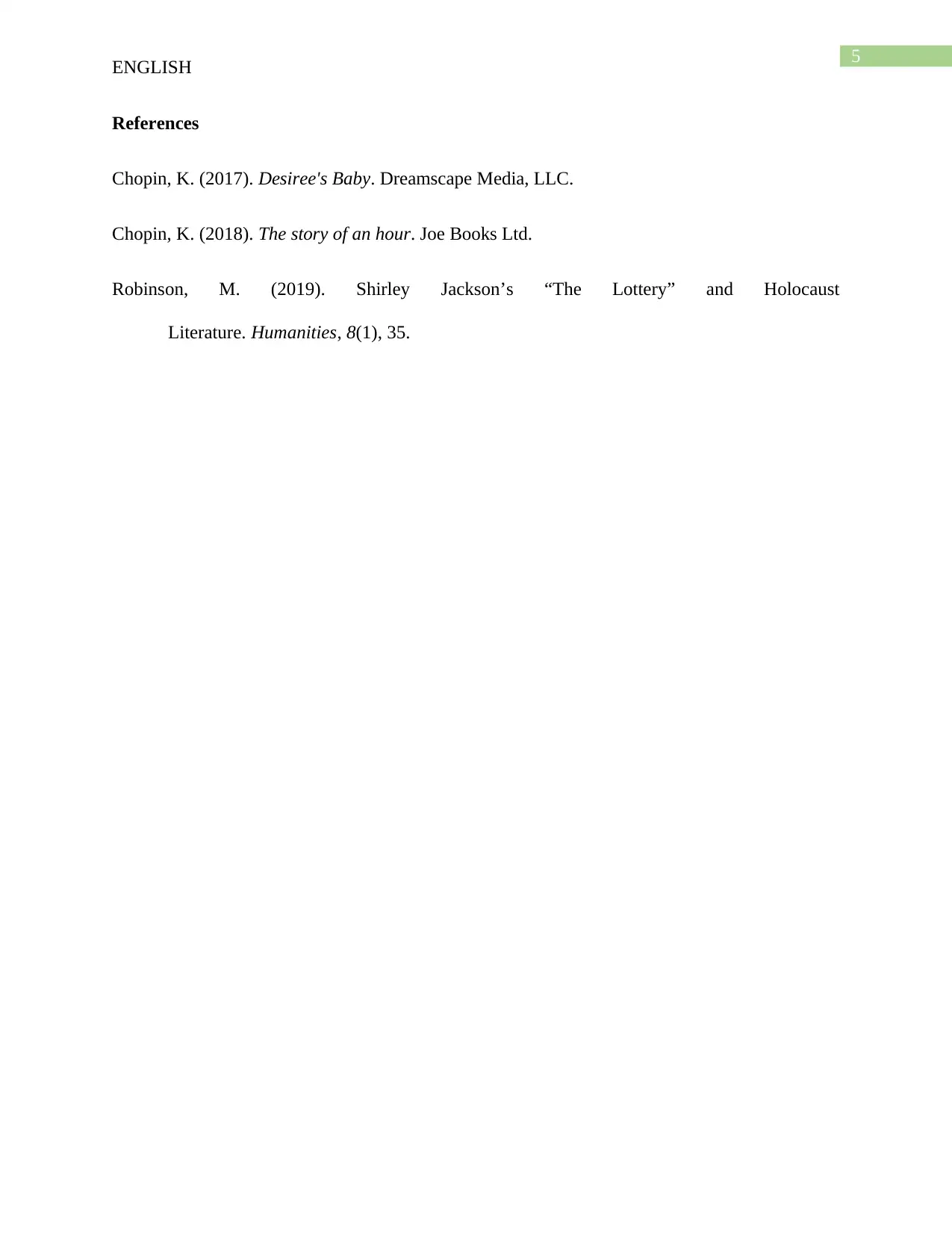
5
ENGLISH
References
Chopin, K. (2017). Desiree's Baby. Dreamscape Media, LLC.
Chopin, K. (2018). The story of an hour. Joe Books Ltd.
Robinson, M. (2019). Shirley Jackson’s “The Lottery” and Holocaust
Literature. Humanities, 8(1), 35.
ENGLISH
References
Chopin, K. (2017). Desiree's Baby. Dreamscape Media, LLC.
Chopin, K. (2018). The story of an hour. Joe Books Ltd.
Robinson, M. (2019). Shirley Jackson’s “The Lottery” and Holocaust
Literature. Humanities, 8(1), 35.
1 out of 5
Related Documents
Your All-in-One AI-Powered Toolkit for Academic Success.
+13062052269
info@desklib.com
Available 24*7 on WhatsApp / Email
![[object Object]](/_next/static/media/star-bottom.7253800d.svg)
Unlock your academic potential
Copyright © 2020–2026 A2Z Services. All Rights Reserved. Developed and managed by ZUCOL.





